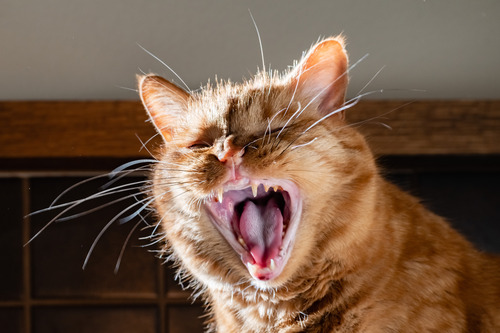If your cat is experiencing any changes in urination (increased or decreased) and vocalizing or meowing, call your vet right away as this can be a life-threatening condition. When cats start to deviate from their normal behavior, it can be a sign of an underlying issue. These changes in behavior are often indicators of medical conditions, stress, or environmental factors that need to be addressed promptly. If you’re wondering, “Why is my male cat peeing everywhere and meowing so much?” this blog will help you explore the possible causes and what you should do next. Call Dix Hills Animal Hospital at (631) 271-8383 for expert guidance.
Medical Conditions That Can Cause Frequent Urination and Meowing
One of the most common reasons a male cat starts peeing everywhere and meowing excessively is a medical issue. Certain health conditions can cause increased urination, discomfort, and vocalization as a way of expressing distress.
Urethral Obstruction/ Urinary Blockage
IF YOU SUSPECT THIS, CALL YOUR VET ASAP. IF an animal can not pee, the urine builds up in the bladder with no exit. Toxins build up in the blood stream and the bladder can even rupture, resulting in death. This is the more common in young, male indoors cats but can happen to any cat or dog. You usually see a cat going frequently into the litter box, straining to urinate and nothing coming out. This is extremely painful and cats are often meowing loudly. If you see this, this is an EMERGENCY.
Urinary Tract Infections (UTIs)
A urinary tract infection (UTI) can make urination painful, leading your cat to associate the litter box with discomfort. As a result, he may begin peeing outside the box. UTIs are often accompanied by frequent urination, straining, and even blood in the urine. Your cat may also meow excessively due to discomfort or frustration.
Feline Lower Urinary Tract Disease (FLUTD)
Feline Lower Urinary Tract Disease (FLUTD) is an umbrella term for various conditions that affect a cat’s bladder and urethra, usually related to stress. Symptoms include difficulty urinating, bloody urine, excessive grooming of the genital area, and vocalizing in pain. FLUTD can predispose male cats to urinary blockage so if you see these symptoms it is important to address them early to avoid urinary blockage.
Bladder Stones
Bladder stones can develop in a cat’s urinary tract and cause pain, making urination difficult. Your cat may try to urinate frequently but only produce small amounts of urine. This can lead to urinating outside the litter box and increased vocalization due to discomfort. Bladder stones can predispose animals to urinary blockage so if you see these symptoms it is important to address them early to avoid urinary blockage.
Diabetes or Kidney Disease
If your cat is drinking more water than usual and urinating excessively, diabetes or kidney disease could be the culprit. Both conditions lead to increased thirst and urination, and in some cases, your cat may meow more as he feels unwell or seeks attention. If you suspect a medical issue, contact Dix Hills Animal Hospital at (631) 271-8383 or book an appointment online today to get your cat examined.
Behavioral Reasons for Peeing Outside the Litter Box
If your male cat is peeing everywhere and meowing excessively but does not have a medical condition, the issue may be behavioral. Cats are sensitive creatures, and any changes in their environment or routine can affect their bathroom habits and vocalization.
Territorial Marking
Male cats, especially those that are not neutered, may spray urine to mark their territory. This is a natural behavior used to communicate with other cats. Neutering your cat can help reduce or eliminate territorial spraying.
Stress or Anxiety
Cats thrive on routine, and any changes—such as a new pet, a move, or even a change in household members—can cause stress. When stressed, cats may urinate outside the litter box and vocalize more to express their anxiety. Providing a stable environment with familiar scents, interactive playtime, and hiding spots can help reduce stress.
Litter Box Issues
A dirty litter box, the wrong type of litter, or an undesirable location can cause your cat to avoid using it. Make sure the litter box is cleaned daily, placed in a quiet area, and is easily accessible. Some cats also prefer certain types of litter, so experimenting with different textures might help resolve the issue.
How to Address Your Cat’s Behavior
Now that you have a better understanding of why your male cat is peeing everywhere and meowing excessively, let’s look at what you can do to address the behavior and improve your cat’s well-being.
Visit the Veterinarian
If your cat’s behavior has changed suddenly, scheduling a veterinary visit is essential. A thorough check-up can determine whether a medical condition is the cause and ensure that your cat gets the proper treatment. Early detection of issues like urinary blockages or infections can prevent more serious complications.
Provide a Stress-Free Environment
If stress or anxiety is the root cause of your cat’s behavior, try to identify the source and make adjustments. Maintain a consistent daily routine, introduce changes gradually, and offer plenty of enrichment, such as scratching posts, cat trees, and interactive toys.
Maintain a Clean and Appealing Litter Box
Regular cleaning and providing the right type of litter box setup can encourage proper usage. Consider adding an extra litter box in another area of your home, especially if you have multiple cats. A good rule of thumb is to have one more litter box than the number of cats in your household.
Neuter Your Cat
If your male cat has not been neutered, this may be a key factor in his excessive meowing and urination outside the litter box. Neutering can significantly reduce territorial marking behaviors and help calm his overall demeanor.
How to Know If Your Pet’s Condition Requires Veterinary Care
If your male cat’s excessive urination and meowing continue despite your efforts to resolve the issue, professional help may be necessary. Your veterinarian can rule out medical concerns, and an animal behaviorist can provide guidance on modifying unwanted behaviors. Addressing the issue early will help ensure your cat’s health and happiness. Dix Hills Animal Hospital in Huntington, NY, is here to assist you. If you’re concerned about your cat’s behavior, call (631) 271-8383 or book an appointment online today!





